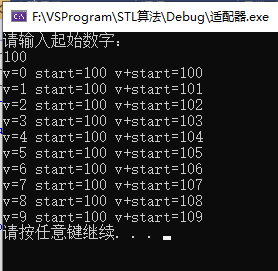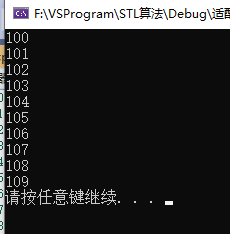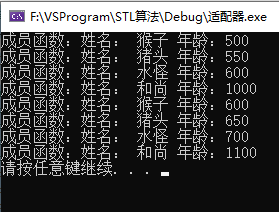函数适配器bind1st bind2nd
现在我有这个需求 在遍历容器的时候,我希望将容器中的值全部加上100之后显示出来,怎么做?
我们直接给函数对象绑定参数 编译阶段就会报错
for_each(v.begin(), v.end(), bind2nd(myprint(),100));
如果我们想使用绑定适配器,需要我们自己的函数对象继承binary_function 或者 unary_function
根据我们函数对象是一元函数对象 还是二元函数对象
函数适配器
- 0~9 加起始值 进行输出 用户提供起始值
- bind2nd 绑定
- 继承 binary_function<参数类型1,参数类型2,返回值类型>
- const修饰 operator()
#define _CRT_SECURE_NO_WARNINGS #include <iostream> using namespace std; #include <vector> #include <algorithm> #include <functional> class myPrint:public binary_function<int,int, void> //虚继承类binary_function<参数类型1,参数类型2,返回值类型> { public: void operator()(int v, int start)const //const修饰 { cout << "v=" << v << " start=" << start << " v+start=" << v + start << endl; } }; void test01() { vector<int>v; for (int i = 0; i < 10; i++) { v.push_back(i); } cout << "请输入起始数字:" << endl; int num; cin >> num; //for_each(v.begin(), v.end(), bind1st(myPrint(), num)); //bind1st 将参数绑定为函数对象的第一个参数 num作为v 而v迭代出来的数据作为start for_each(v.begin(), v.end(), bind2nd(myPrint(), num)); //bind2nd 将参数绑定为函数对象的第二个参数 num作为start数据 } int main() { test01(); system("Pause"); return 0; }
bind1st结果:

bind2nd结果:

取反适配器
- not1 一元 找出小于5
- not2 二元 排序 not2( less<int>() ) 从大到小 相当于 greater<int>()
//取反适配器 class GreaterThenFive:public unary_function<int, bool> //取反适配器继承于unary_function { public: bool operator()(int v)const { return v > 5; } }; void test02() { //一元取反 vector<int>v; for (int i = 0; i < 10; i++) { v.push_back(i); } //查找大于5的数字 vector<int>::iterator pos = find_if(v.begin(), v.end(), GreaterThenFive()); if (pos != v.end()) //6 { cout << "找到大于5的数字: " << *pos << endl; } else { cout << "未找到" << endl; } //改变需求 查找小于5的数字 pos = find_if(v.begin(), v.end(), not1(GreaterThenFive())); if (pos != v.end()) //0 { cout << "找到小于5的数字: " << *pos << endl; } else { cout << "未找到" << endl; } //绑定取反 pos = find_if(v.begin(), v.end(), not1(bind2nd(greater<int>(), 5))); //利用内建函数greater v迭代器作为1值 5作为2值做取反 if (pos != v.end()) //0 { cout << "找到小于5的数字: " << *pos << endl; } else { cout << "未找到" << endl; } }
结果:

函数指针适配
- 关键字 ptr_fun
- 将函数指针适配成函数对象
//普通函数指针适配 void myPrint02(int v, int start) { cout << v + start << endl; } void test03() { vector<int>v; for (int i = 0; i < 10; i++) { v.push_back(i); } //将函数指针适配成函数对象 //关键字 ptr_fun //for_each(v.begin(), v.end(), bind2nd(myPrint02,100)); //error 普通函数不能绑定数值 for_each(v.begin(), v.end(), bind2nd(ptr_fun(myPrint02), 100)); //把普通函数适配成函数对象 然后绑定起始值 }
结果:

成员函数适配器
- 如果容器存放的是对象指针, 那么用mem_fun
- 如果容器中存放的是对象实体,那么用mem_fun_ref
//成员函数适配器 class Person { public: Person(string name, int age) { this->m_Age = age; this->m_Name = name; } void showPerson() { cout << "成员函数:姓名: " << m_Name << " 年龄:" << m_Age << endl; } void plusAge() { this->m_Age += 100; } string m_Name; int m_Age; }; void test04() { vector<Person>v; Person p1("猴子", 500); Person p2("猪头", 550); Person p3("水怪", 600); Person p4("和尚", 1000); v.push_back(p1); v.push_back(p2); v.push_back(p3); v.push_back(p4); //for_each(v.begin(), v.end(), &Person::showPerson); //error 提示项不会计算为接收1个参数的函数 需要适配器 //成员函数适配器 // mem_fun_ref for_each(v.begin(), v.end(), mem_fun_ref(&Person::showPerson)); //打印 for_each(v.begin(), v.end(), mem_fun_ref(&Person::plusAge)); //增寿 没个成员都执行一套逻辑 for_each(v.begin(), v.end(), mem_fun_ref(&Person::showPerson)); //增寿后打印 }
结果:

对象指针类型
void test05() { vector<Person*>v; Person p1("猴子", 500); Person p2("猪头", 550); Person p3("水怪", 600); Person p4("和尚", 1000); v.push_back(&p1); v.push_back(&p2); v.push_back(&p3); v.push_back(&p4); //成员函数适配器 数据类型为对象指针 // mem_fun for_each(v.begin(), v.end(), mem_fun(&Person::showPerson)); //打印 }
结果:



